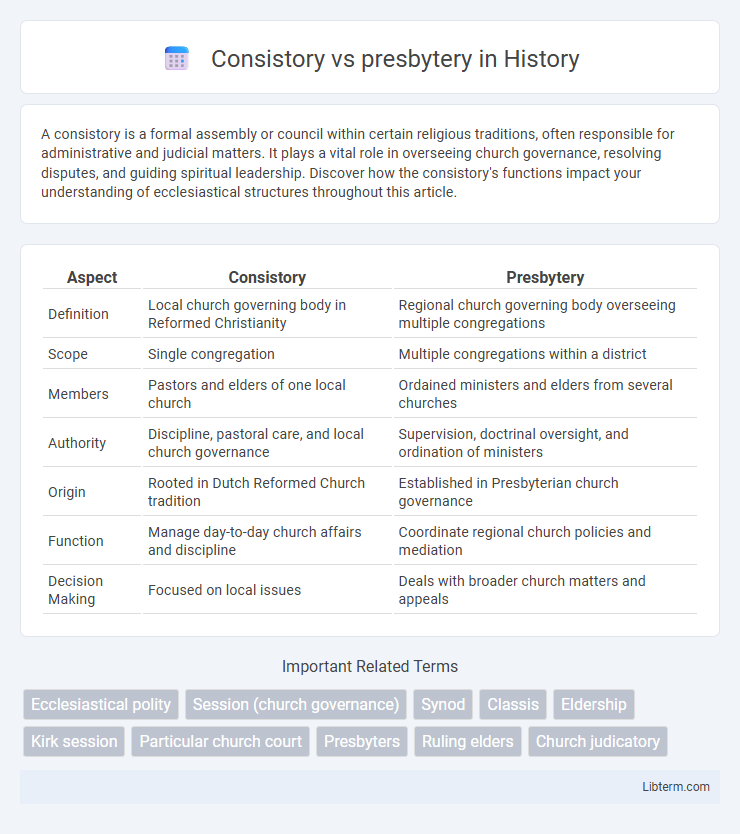A consistory is a formal assembly or council within certain religious traditions, often responsible for administrative and judicial matters. It plays a vital role in overseeing church governance, resolving disputes, and guiding spiritual leadership. Discover how the consistory's functions impact your understanding of ecclesiastical structures throughout this article.
Table of Comparison
| Aspect | Consistory | Presbytery |
|---|---|---|
| Definition | Local church governing body in Reformed Christianity | Regional church governing body overseeing multiple congregations |
| Scope | Single congregation | Multiple congregations within a district |
| Members | Pastors and elders of one local church | Ordained ministers and elders from several churches |
| Authority | Discipline, pastoral care, and local church governance | Supervision, doctrinal oversight, and ordination of ministers |
| Origin | Rooted in Dutch Reformed Church tradition | Established in Presbyterian church governance |
| Function | Manage day-to-day church affairs and discipline | Coordinate regional church policies and mediation |
| Decision Making | Focused on local issues | Deals with broader church matters and appeals |
Understanding Consistory and Presbytery
Understanding consistory and presbytery involves recognizing their distinct roles within Presbyterian church governance. A consistory typically refers to the local church's ruling body, consisting of elders and the pastor, responsible for spiritual guidance and administrative decisions. Presbytery, on the other hand, is a regional governing body that oversees multiple congregations, providing support, ordaining ministers, and ensuring doctrinal uniformity.
Historical Backgrounds: Consistory vs Presbytery
The consistory originated in the Reformed churches of the 16th century, primarily in the Netherlands and Switzerland, functioning as a local church court overseeing discipline and doctrine. The presbytery emerged in the Scottish and Presbyterian traditions as a regional governing body composed of multiple elders and ministers, responsible for broader ecclesiastical oversight. Both institutions reflect the Reformation's emphasis on collective church governance but diverge in scope, with consistories focusing locally and presbyteries operating at a regional level.
Definitions and Key Characteristics
A Consistory is a governing body in Reformed churches composed of pastors and elders responsible for church discipline, spiritual oversight, and administration at the local congregation level. A Presbytery, in Presbyterian polity, functions as a regional assembly of multiple congregations' ministers and elders, tasked with ordaining ministers, governing doctrine, and broader church governance. Both bodies emphasize collective leadership but differ in scope, with Consistories serving individual congregations and Presbyteries overseeing multiple churches within a geographical area.
Governance Structures Compared
Consistory and presbytery represent distinct governance structures within Reformed and Presbyterian church traditions, respectively. A consistory typically refers to the local governing body composed of elders and ministers responsible for church discipline, worship, and spiritual oversight within a single congregation. In contrast, a presbytery functions as a regional assembly overseeing multiple congregations, providing broader ecclesiastical authority, ordination of ministers, and doctrinal supervision across a defined geographic area.
Roles and Responsibilities
The consistory functions as the local church governing body responsible for spiritual oversight, discipline, and congregation care, often including elders and ministers. The presbytery oversees multiple congregations within a geographic region, focusing on ordination, church planting, pastoral support, and doctrinal unity. Together, these bodies ensure theological consistency, governance, and accountability within Presbyterian and Reformed traditions.
Geographic Prevalence and Denominational Ties
Consistories are predominantly found in Reformed and Dutch Calvinist churches, especially within European countries like the Netherlands and parts of Switzerland, where they serve as regional elders' courts governing church discipline and administration. Presbyteries, integral to Presbyterian denominations, are widespread in Scotland, the United States, and other English-speaking countries, functioning as regional governing bodies overseeing multiple congregations. The geographic prevalence of consistories aligns closely with Continental Reformed traditions, while presbyteries correspond to Scottish and American Presbyterian ecclesiastical structures.
Decision-Making Processes
Consistories typically involve decision-making processes focused on local church governance, with elders and deacons collaboratively addressing spiritual and administrative matters. Presbyteries operate as regional governing bodies, making decisions that affect multiple congregations, often involving representatives from each church to discuss ordination, doctrinal issues, and broader church policies. The presbytery's decisions tend to carry wider authority beyond the local congregation, whereas consistories maintain authority primarily within the individual church context.
Leadership Composition
Consistory leadership comprises a group of elders and deacons responsible for spiritual oversight and church discipline within Reformed and Presbyterian traditions, often including both ruling and teaching elders. Presbytery leadership consists of multiple church elders and ministers representing various congregations, functioning as a governing body that oversees doctrine, church order, and ordination. The consistory operates at the local congregational level, while the presbytery holds authority over a regional group of churches, reflecting a broader scope of ecclesiastical governance.
Influence on Congregational Life
The consistory, typically found in Reformed churches, exercises direct spiritual oversight and discipline, shaping congregational life through close pastoral care and decision-making on membership and worship practices. In contrast, the presbytery, common in Presbyterian governance, governs a group of congregations, influencing congregational life by providing broader doctrinal guidance, supporting ministers, and fostering inter-church cooperation. Both structures impact congregational life significantly, with consistories offering localized authority and presbyteries ensuring doctrinal unity and resource sharing among multiple churches.
Key Differences Summarized
Consistory refers to the governing body in Reformed and Presbyterian churches, typically composed of elders and ministers responsible for spiritual oversight and church discipline within a local congregation. Presbytery, by contrast, is a regional governing assembly made up of multiple ministers and elders from several churches, focusing on broader ecclesiastical governance, ordination, and inter-church matters. The key difference lies in scope and authority: consistory governs a single congregation, while presbytery oversees multiple churches within a district.
Consistory Infographic

 libterm.com
libterm.com